Staying well and protecting ourselves from the Coronavirus (COVID-19) is on everyone's mind right now. Social distancing is now a catchphrase and people are paying attention to washing hands, using hand sanitizer and avoiding hugs and handshakes. This is common sense and helps prevent the spread of disease. I believe we should be doing everything we can to mitigate the spread of the virus and flatten the curve.
To this effect, schools are closed and many counties in California are being ordered to “shelter in place”. The speed at which this pandemic is escalating is very concerning, yet there is also a positive aspect where people are showing up to support each other (from a distance) and we are realizing just how reliant we have become on global commerce. The gift, in all this craziness, is that we will pull together as smaller local communities to become more self-reliant and resilient. The earth is also breathing a huge sigh of relief from the slowdown.
I believe in being prepared but I don't believe panicking is a helpful response. Panic and worry increase our cortisol levels, makes us lose sleep and contributes to a lowered immune system. Which is the exact opposite of what we are trying to achieve! Now is a good time to turn to your herbal allies, homeopathy and flower essences for stress and anxiety (more on that in a separate article coming soon!)
Many people are asking us what I recommend in terms of herbs and supplements for coronavirus.
As an herbalist and naturopath, it’s hard to generalize and come up with a one size fits all list of herbs for several reasons.
1) I don't have first-hand experience of the symptoms of the novel COVID-19 virus yet, not many herbalists do at this time. All protocols are, at best, an educated and theoretical guess, especially since this is a novel strain.
2) Every individual is different and responds differently to an illness according to their constitution and vitality. As a holistic health practitioner, I was taught to treat the person and not the disease.
3) I believe that our best bet to fight the disease is to support our vitality and immune systems through diet, lifestyle, environment and stress reduction. That means, eat well, get some exercise, wash your hands, stay away from other people, and try not to worry!
Once those basics are taken care of, we can turn to herbs to support our health. Below are some general herbal suggestions for prevention and treatment of colds and flu.
Many of these herbs are also likely to be helpful with prevention and treatment of coronavirus, depending on which symptoms are present. From what I’ve read, it seems that a fever and a dry cough are the main symptoms of COVID-19 with more serious symptoms of difficulty breathing, pneumonia and cytokine storm in a smaller percentage of complicated cases. From a Traditional Chinese Medicine view it looks like the virus is a damp and cold condition calling for warming and aromatic herbs.
Herbs For Prevention
Astragalus
Astragalus membranaceous
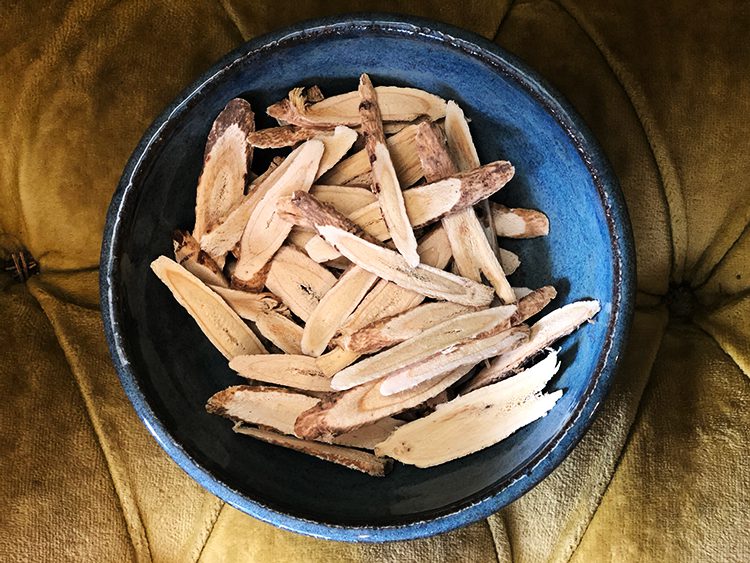
If I had to choose just one herb to that would be helpful to build immunity against the threat of coronavirus- it might be Astragalus. Astragalus is a warming and tonic herb that comes to us from Traditional Chinese Medicine and is often added to soups and broths. Astragalus is a deep immune modulator as well as having a special affinity with the lungs. Rather than simply stimulating the immune system, astragalus has a balancing action on cytokines.
Cytokines are small, soluble proteins that act as intracellular mediators in an immune response. From what I've read about the coronavirus, deaths are mostly occurring due to secondary pneumonia and cytokine storms. With Astragalus we do not have to worry about inducing a cytokine storm and astragalus acts like a protective shield that keeps out the cold and other external pathogens.
Astragalus root is one of the premier herbs for the prevention of colds, flu and upper respiratory tract infections. Astragalus is my go-to herb for the frail and elderly who are susceptible to bronchitis and pneumonia. Since this population seems to be the most vulnerable to developing secondary complications from COVID-19, I am adding this herb to my patient recommendations for prevention. If a person gets acutely ill, however, I would recommend stopping astragalus as Chinese practitioners warn that it may ‘tonify’ the illness.
Elderberry
Sambucus nigra
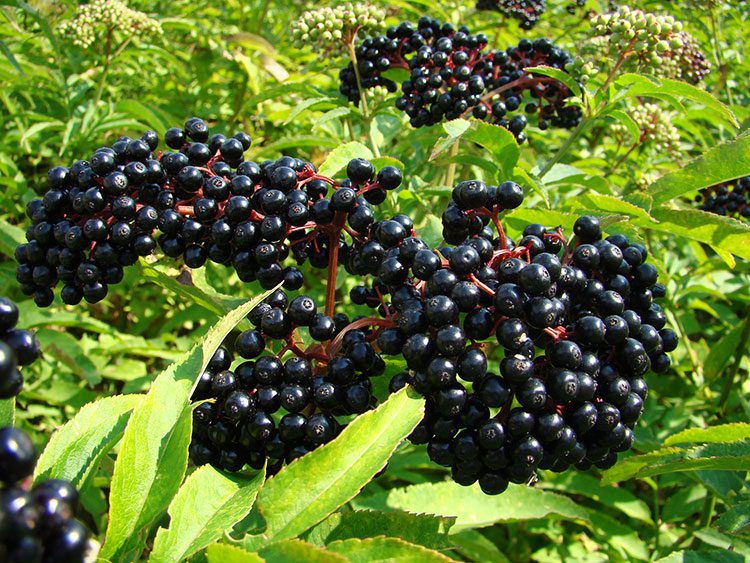
Black elderberry (Sambucus nigra) contains a protein which directly inhibits viral entry and replication in human cells. These tiny purple powerhouses are packed full of antiviral and antioxidant compounds which can boost your body's immune system and help lessen the severity of colds and flu.
In herbalist circles there has been some concern about elderberries potential of up-regulating cytokines. Since "cytokine storm" is one of the reported complications of the COVID-19 virus, some people are wondering if elderberry is safe for this particular virus. Cytokine storm involves dysregulation between pro-inflammatory cytokines, anti-inflammatory cytokines and regulatory cytokines and can be potentially fatal. Elder is an immune modulator and has been shown to increase BOTH inflammatory and anti-inflammatory cytokines to activate a healthy immune response.
It's reassuring to know that here have been NO reported cases of elderberry-induced cytokine storms. For this reason, many respected herbalists continue to recommend elderberry as an effective herb to help protect against viral illnesses (including COVID-19).
Personally, I continue to give it to all my family, including children. I view elderberry syrup as “food as medicine” like garlic and rosemary. Black elderberries are very safe as long as they are prepared properly (do not consume raw) and elderberries can also be taken once ill to shorten the duration of colds and flu.
Medicinal Mushrooms
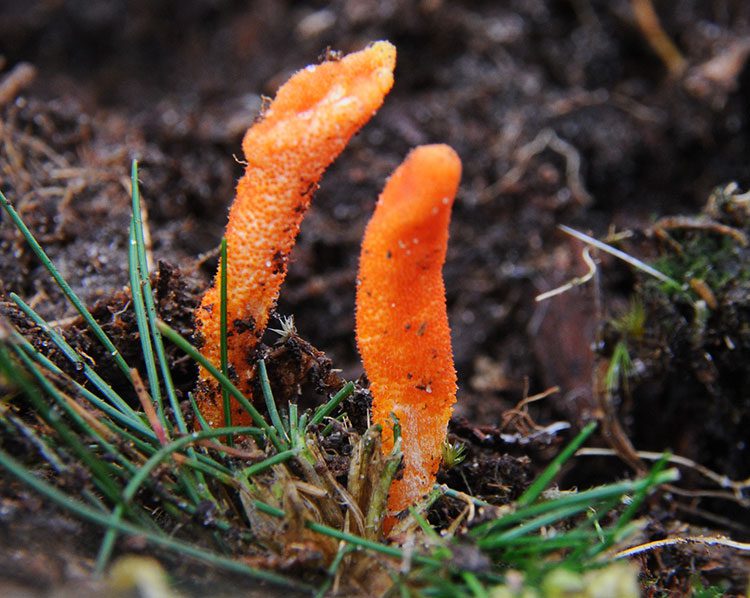
Medicinal mushrooms contain polysaccharides and triterpenes which modulate immune system function, and therefore are wonderful class of herbs to add to your viral defense medicine cabinet. Below I mention two mushrooms which I believe are indicated but there are many more, such as shitake, turkey tail, and chaga which can also be helpful.
Cordyceps
Cordyceps militaris
Cordyceps is useful for the prevention of viral infections because they contain powerful anti-viral compounds such as cordycepin. Several studies have shown cordycepin to have antiviral activity against Epstein Barr Virus, influenza virus and HIV. In Chinese medicine, cordyceps was traditionally used to reduce fatigue, boost libido and fight lung and kidney disease.
Cordyceps has a balancing action on cytokine levels and its cytokine suppressing action has been shown to reduce inflammation in the airways of mice. Cordyceps also increases production of ATP (energy) in human cells and may improve the way your body uses oxygen. This action might theoretically be extrapolated for improving oxygen delivery to the airways due to breathing difficulties caused by COVID-19.
In any case, cordyceps is an adaptogen (which by definition, means it can be taken safely over the long term as a tonic) with a special affinity for the lungs. Cordyceps can also be helpful during the recovery phase of an illness, especially where fatigue dominates. This seems like a good time to be adding cordyceps to your daily routine. I also recommend cordyceps for people recovering from colds and flu where the convalescence phase leaves the patient very weak and tired and the lungs need strengthening.
Red Reishi
Ganoderma lucidum
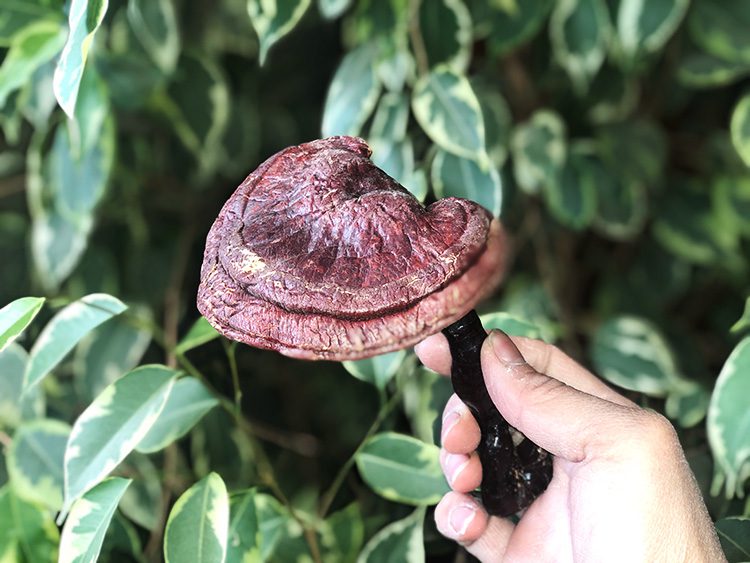
Red Reishi, also known as the mushroom of immortality or Lingzhi, is another powerful medicinal mushroom that can both up-regulate or down-regulate cytokines to balance the immune response. Reishi is used to modulate the immune system, for viral infections such as the flu and for lung conditions such as asthma and bronchitis. It is often used for chronic viral infection as well as a preventative for threatened viral infection.
Reishi has been shown to increase the production of interferon, which protects cells from viral infection, by up to 30 times. Reishi can easily be added to soups and stews and has the added benefit of “calming the spirit” and relieving anxiety and depression in these uncertain times.
Herbs For Fever
Fever is feared by most people, and most people are taught to immediately suppress a fever with medications. However, holistic practitioners, view fever as a natural response by the body to fight off infections. Herbalists believe that a fever should be supported, and not suppressed, unless it reaches a temperature that is truly life threatening (which is very rarely). The most important factor to consider when a person has fever is to make sure they do not become dehydrated!
Yarrow
Achillea millefolium
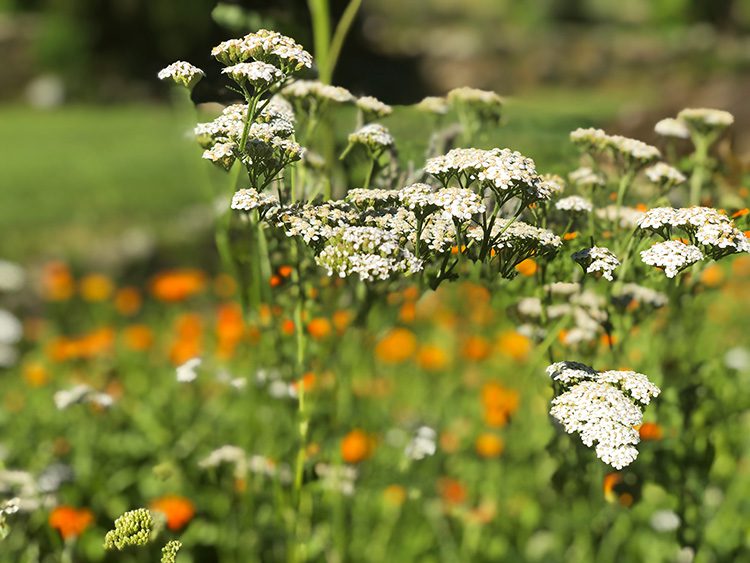
Yarrow is one of our best herbs for fever and flu symptoms. It is anti-inflammatory, as well as being antimicrobial and analgesic (pain relieving). Yarrow is also anti-catarrhal, meaning that it will reduce mucus and congestion in the sinuses and lungs due to its drying and astringent properties. Prepared as a hot infusion, yarrow will help you sweat out a fever due to its diaphoretic action (relaxes the peripheral blood vessels and opens the pores). A classic tea for fever is YEP (equal parts yarrow, elder and peppermint).
Elderflower
Sambucus nigra
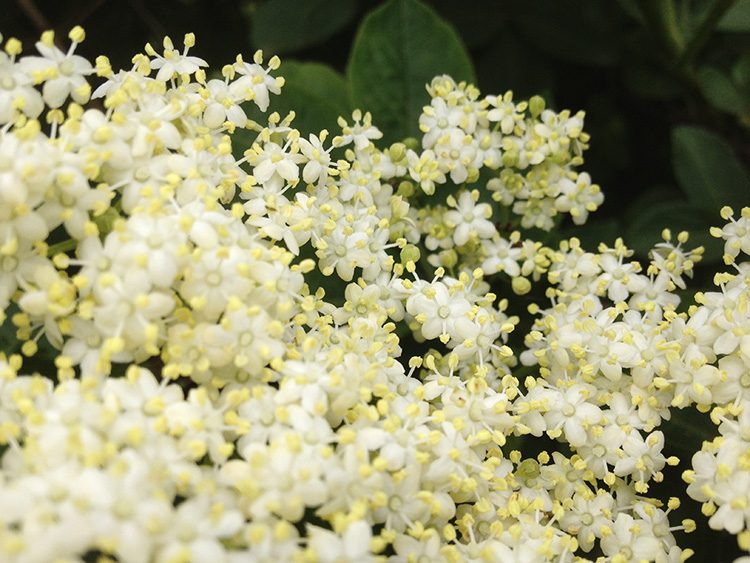
Unlike yarrow and boneset, which are very bitter, elderflowers make a pleasant tasting alternative for children. It is also gentle enough for pregnant and nursing moms and the elderly to use. Elderflowers cool a fever by relaxing the peripheral blood vessels and allowing the body to sweat. To enhance this diaphoretic action, it is best prepared as a hot infusion. Elderflowers are also anti-inflammatory, anti-catarrhal and antibacterial, making them helpful for sinus congestion, coughs and most upper respiratory infections and allergies. For fever in children, the combination of elderflowers, catnip and linden flowers is particularly soothing for the nervous system, helping them to relax and sleep.
Peppermint
Mentha piperita

Another herb which is useful for fever is the humble and easily available peppermint. Like elderflower, it tastes good and kids love it! Peppermint is cooling and soothing for a fever and opens the pores to let sweat out. Sweating is a natural way for the body to detoxify. Peppermint also contains menthol which is a known muscle relaxant and soothes the sore muscles, headache and body aches associated with a fever.
Boneset
Eupatorium perfoliatum
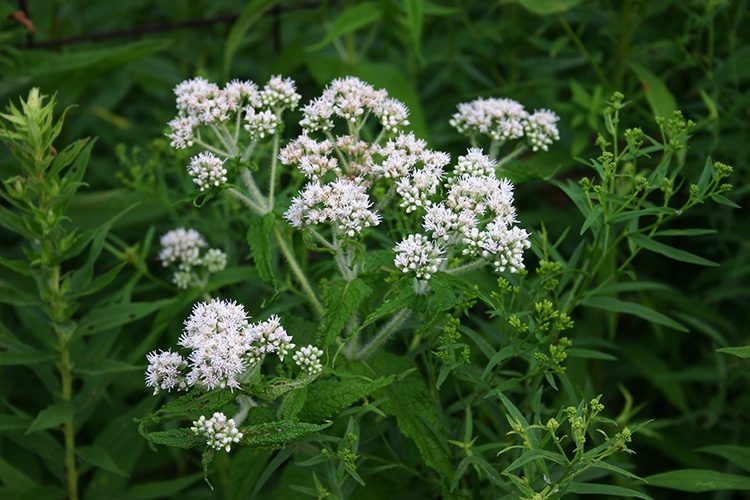
Boneset (Eupatorium perfoliatum) was a favorite treatment of American physician-herbalists in the great influenza epidemic of 1916-1918. There has been little scientific research on boneset, but a couple of studies suggest that its water-soluble polysaccharides increases host defenses against viruses. Boneset has been used in traditional herbalism to lower fevers (via a sweating action) and to help with the bone aches and pain associated with influenza. The main problem with boneset is that it is extremely bitter and doesn’t taste great as a tea. It combines well with fresh ginger to offset its cooling bitter properties. I have seen herbalists recommend drinking up to 6 cups a day of strong boneset infusion for people with Covid-19 fever. I would personally add a few slices of fresh ginger to the brew.
Respiratory Herbs
Mullein
Verbascum Thapsus
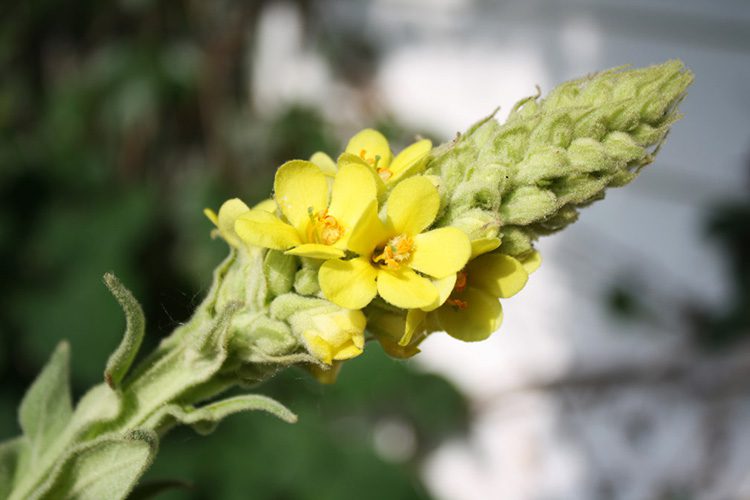
Mullein deserves its place as a time-honored cough remedy. It’s demulcent and emollient action means it is soothing and moistening and to the respiratory tissues. Mullein also has an expectorant action that helps to expel mucus and catarrh from the lungs.
King’s Dispensatory writes that “Mullein is demulcent, diuretic, anodyne, and antispasmodic. It is mildly nervine, controlling irritation, and favoring sleep. Upon the upper portion of the respiratory tract its influence is pronounced…it is applicable to dry, hoarse coughs, which occur chiefly at night, as well as to a cough associated with an abundant catarrhal discharge.”
Mullein was used as a leading remedy for tuberculosis in the 19th century and the British Herbal Pharmocaopeia says mullein is indicated for ‘bronchitis, tracheitis, influenzal cold with respiratory catarrh’. Mullein grows wild and is readily available here in Northern California, which is comforting to know in these unprecedented times when herbal supplies may be limited.
Thyme
Thymus vulgaris
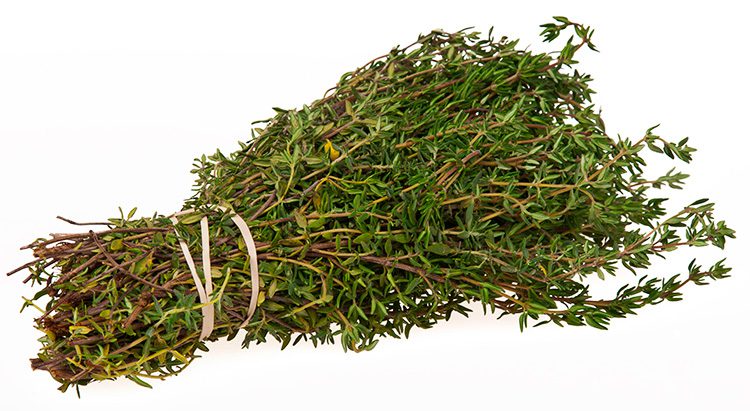
Thyme is a common culinary herb often overlooked for its powerful antimicrobial properties. It is very useful in fighting infections in the respiratory tract. Nicholas Culpeper recommends thyme for lung ailments. “It is a noble strengthener of the lungs, as notable as one as grows…It purgeth the body of phlegm, and, is an excellent remedy for the shortness of breath.”
Thyme also has a strong antispasmodic and antibacterial action due to the presence of thymol, which makes it very useful for coughs and lung infections. In Europe thyme is used to support treatment of spasmodic coughs, bronchitis, whooping cough, emphysema and even asthma. It is mostly used as a tea but can also be used as an herbal steam inhalation for the respiratory tract.
Thyme is a perennial herb and is super easy to grow in the garden or in pots. Only thyme will tell if it will be useful for coronavirus…
Marshmallow root
Althaea officinalis
Marshmallow Root is a classic and very effective respiratory demulcent. Its slimy mucilage will coat the respiratory tract and soothe irritated mucus membranes. Marshmallow will bring immediate soothing relief for sore throats, bronchial asthma, pleurisy, bronchitis, or anytime that a cough is caused by dry and irritated membranes.
Not only is marshmallow directly demulcent, it also stimulates a reflex demulcency by a mechanism that is still not well understood. Simon Mills says marshmallow stimulates a vital reflex that tells the mucus membranes to produce a moistening and protective barrier to soothe coughs caused by dryness and irritation.
Gumweed
Grindelia squarrosa
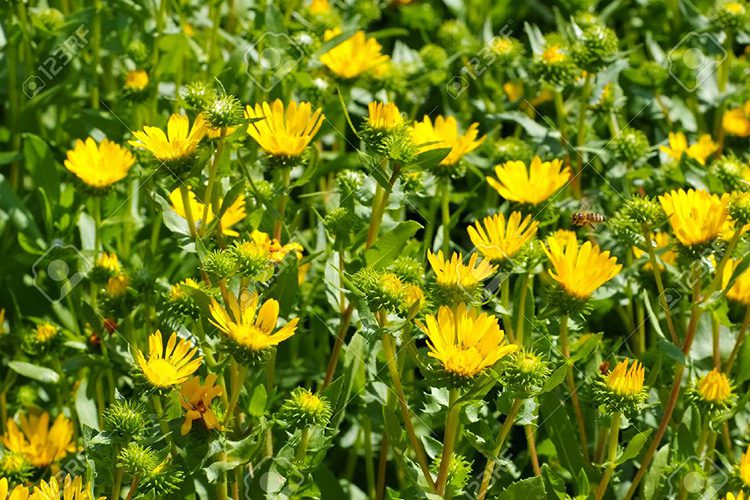
Grindelia is also known as sticky gumweed (the flowers contain an aromatic and resinous milky white gum) and was used by native Americans as a topical for poison oak and for coughs and congestion. It was favored by the Eclectic physicians for asthma and bronchitis in the early part of the 20th century. My experience with grindelia is that it is an exceptional expectorant for dry, lingering coughs that are unproductive. This is almost the opposite of osha root which is more helpful for wet productive coughs.
Grindelia supports the respiratory system and assists in the normal production and elimination of mucus. It also has as an antispasmodic action which makes it useful for asthma and labored breathing. Grindelia, was traditionally paired with Yerba Santa, another warming and aromatic herb native to the Sierra Nevada.
Elecampane
Inula helenium
Elecampane is a stimulating and warming expectorant that encourages catarrh to be expelled from the chest and lungs. Elecampane root contains up to 45% inulin which is a prebiotic for the gut and enhances immune function. It also contains aromatic essential oils which are soothing to the respiratory tract as well as being antimicrobial.
Elecampane was used traditionally to treat cough, wheezing in the lungs, difficulty breathing, bronchitis, asthma and tuberculosis. It is one of our best and most reliable remedies for both acute and chronic pulmonary complaints.
Elecampane is more indicated for wet productive coughs and from what I’ve read most of the coughs from COVID-19 are dry, but I’m putting this herb here for those that may get a wet cough. Elecampane’s energetics are warming and aromatic which fits well with the dampness picture in Chinese medicine. I find that elecampane works well when combined in a formula with other herbs. It is also fairly easy to grow in an herb garden and the roots are best harvested in the fall for a higher inulin content.
Hyssop
Hyssopus officinalis
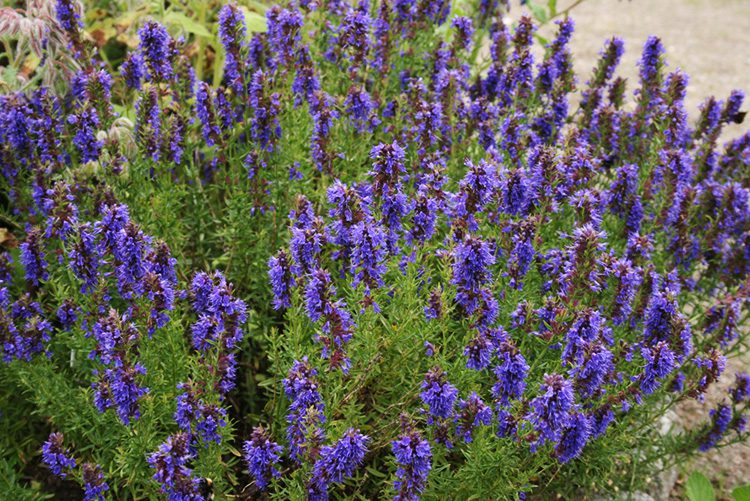
Hyssop is another warming and stimulating expectorant and has an anti-viral action making it suitable for colds, flu and fevers. It is also effective as a gargle for sore throats. The other main action of hyssop, due to its volatile essential oils, is carminative. It's pleasant flavor makes it especially suitable for children’s respiratory and digestive complaints. Hyssop is easy to grow in an herb garden and is something I like to keep in my viral defense apothecary.
Conclusion
So far, I haven’t seen someone with first hand symptoms of Covid-19 so the best I can do is recommend using time honored herbs for prevention and treatment of fevers and upper respiratory tract infections caused by viruses. Once I know more, I will update. There are many herbs that I didn’t cover which could be very useful such as garlic, lomatium, osha, propolis, aniseed, coltsfoot and horehound. My advice is to use use what is locally or readily available and what fits your particular situation. Many herbs work well in synergy with each other and I recommend seeing a qualified herbalist to get the best results.
Stay well friends,
Jahwei xo

3 thoughts on “Herbal Support for Coronavirus”
This is a beautiful post, thank you!
Wonderful post. We are currently battling covid and are using several of these.
So much knowledge that I wish were in the “public school curriculum” !
Thank you for much for sharing your knowledge.
Comments are closed.